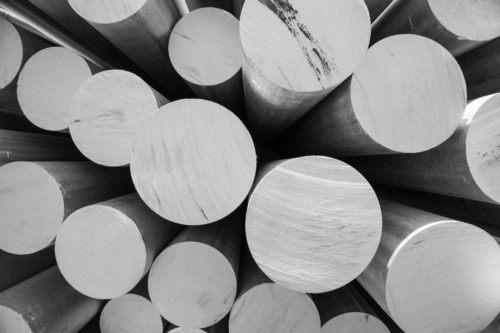Fascination About Stahl Specialty Company
Fascination About Stahl Specialty Company
Blog Article
The Ultimate Guide To Stahl Specialty Company
Table of ContentsSome Known Questions About Stahl Specialty Company.8 Easy Facts About Stahl Specialty Company ShownIndicators on Stahl Specialty Company You Need To KnowSee This Report on Stahl Specialty CompanyThe Of Stahl Specialty Company
The refined difference depends on the chemical content. Chemical Comparison of Cast Aluminum Alloys Silicon promotes castability by decreasing the alloy's melting temperature and enhancing fluidness throughout spreading. It plays a vital role in enabling elaborate mold and mildews to be filled up precisely. Additionally, silicon adds to the alloy's toughness and wear resistance, making it valuable in applications where sturdiness is important, such as vehicle components and engine components.It likewise improves the machinability of the alloy, making it simpler to refine into finished products. This way, iron adds to the general workability of aluminum alloys. Copper raises electrical conductivity, making it advantageous in electrical applications. It also boosts deterioration resistance and includes to the alloy's general strength.
Manganese adds to the toughness of aluminum alloys and boosts workability. It is typically made use of in wrought light weight aluminum products like sheets, extrusions, and profiles. The visibility of manganese aids in the alloy's formability and resistance to splitting during fabrication procedures. Magnesium is a lightweight aspect that provides strength and effect resistance to light weight aluminum alloys.
It permits the manufacturing of light-weight components with exceptional mechanical residential or commercial properties. Zinc enhances the castability of aluminum alloys and assists control the solidification process during casting. It improves the alloy's toughness and firmness. It is often discovered in applications where intricate shapes and fine details are necessary, such as decorative spreadings and specific automotive components.
The Best Strategy To Use For Stahl Specialty Company
Due to the fact that aluminum-silicon alloys have good casting buildings, high gas properties, straightforward processes, and superb corrosion resistance, aluminum-silicon alloys are most generally used in the die-casting industry at home and abroad. At the very same time, aluminum-silicon alloys are additionally relatively early and commonly identified alloys developed and made use of in die-casting. After continual research and improvement, a lot of the existing international mainstream aluminum-silicon alloys have actually been wrapped up and are nothing even more than A356, A360, A380, ADC12, B390, and A413.
The key thermal conductivity, tensile stamina, yield strength, and elongation differ. Select ideal raw materials according to the performance of the target product produced. Amongst the above alloys, A356 has the highest thermal conductivity, and A380 and ADC12 have the lowest. The tensile limit is the opposite. A360 has the most effective yield toughness and the highest possible elongation price.

Getting The Stahl Specialty Company To Work
In precision spreading, 6063 is well-suited for applications where elaborate geometries and high-quality surface coatings are paramount. Examples include telecommunication units, where the alloy's exceptional formability permits sleek and aesthetically pleasing styles while keeping structural honesty. In the Lights Solutions industry, precision-cast 6063 components produce classy and effective illumination fixtures that call for intricate forms and excellent thermal efficiency.
(https://www.openstreetmap.org/user/stahlspecialc)
It results in a better surface area coating and far better deterioration resistance in A360. The A360 displays superior elongation, making it suitable for complicated and thin-walled parts. In accuracy casting applications, A360 is fit for industries such as Customer Electronics, Telecommunication, and Power Devices. Aluminum Casting. Its boosted fluidness enables intricate, high-precision parts like smart device casings and interaction tool housings.

In precision casting, aluminum 413 shines in the Customer Electronic Devices and Power Equipment markets. This alloy's superior deterioration resistance makes it an outstanding option for exterior applications, making sure long-lasting, sturdy products in the stated sectors.
The 7-Minute Rule for Stahl Specialty Company
As soon as you have actually decided that the aluminum die casting process appropriates for your project, a vital following step is choosing the most appropriate alloy. The light weight aluminum alloy you select will substantially impact both the spreading process and the buildings of the final product. Due to this, you must make your decision carefully and take an educated technique.
Figuring out the most suitable light weight aluminum alloy for your application will certainly suggest considering a broad array of qualities. The initial classification addresses alloy qualities that influence the manufacturing process.
The alloy you pick for die spreading straight affects several facets of the casting procedure, like just how simple the alloy is to function with and if it is susceptible to casting defects. Warm breaking, additionally called solidification cracking, is a typical die spreading flaw for light weight aluminum alloys that can result in inner or surface-level rips or splits.
Stahl Specialty Company Can Be Fun For Everyone
Certain aluminum alloys are a lot more susceptible to warm cracking than others, and your option should consider this. One more common flaw discovered in the die spreading of light weight aluminum is die soldering, which is when the i thought about this actors sticks to the die walls and makes ejection hard. It can harm both the cast and the die, so you should look for alloys with high anti-soldering residential or commercial properties.
Rust resistance, which is already a noteworthy characteristic of light weight aluminum, can differ considerably from alloy to alloy and is a vital particular to consider relying on the environmental conditions your product will certainly be revealed to. Put on resistance is an additional building frequently sought in aluminum products and can set apart some alloys.
Report this page